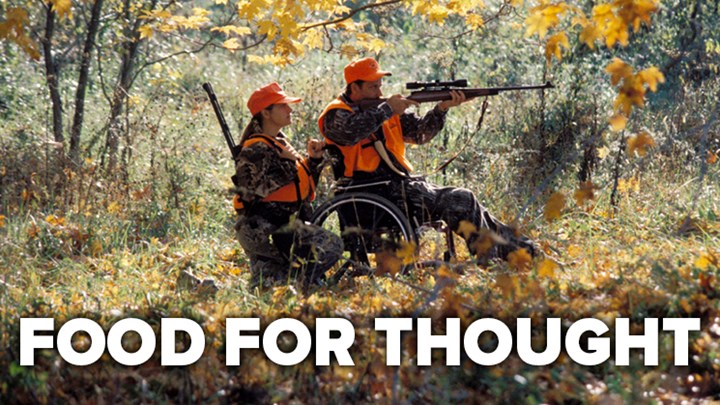
by Ron Spomer - Friday, August 17, 2018

Anti-hunters like to blast hunting for being anything but a “sport” because it’s not an “even contest” and the animals have no chance of winning. Tell that to all the B&C bucks seen only on trail cameras for six years running. Or the ones found dead of old age or a collision on the highway.
The truth is hunting is as much a sport as you wish to make it with the added benefits of simultaneously collecting organic, free-range venison for yourself and family while getting exercise, enjoying Nature, realizing spiritual fulfillment and exercising your genetic potential to its fullest. God/Nature created herbivores and carnivores, the hunted and the hunters. Everything from our stereoscopic vision and dog teeth to our digestive systems and hand-eye coordination brands us the latter. To disavow this is to insult God/Nature.
Unlike most sports, however, hunting comes with variable rules. The playing field isn’t always 100 yards long. Or even level. The game isn’t broken into 15-minute quarters and doesn’t always end at the buzzer. Different states establish somewhat different regulations, too. South Dakota, for instance, doesn’t let pheasant hunters start the daily game until noon or 10 a.m., depending on the date. Kansas lets hunters hit the field at sunrise. Iowa makes them quit at 4 p.m. Wyoming has a 24-caliber minimum for deer hunting. Montana lets you use a .223 Remington if you want. Idaho says it’s okay to rifle elk hunt in full camo. Colorado requires blaze orange. Of course, every state has closed seasons, daily limits, possession limits, sometimes even lifetime limits. There are bans on hunting with artificial light, motorized vehicles, fully automatic firearms, radio communications and so on. Rules of the game. That is what’s meant by “sport hunting.”
But many hunters hold themselves to even higher standards. Some refuse to hunt from a blind or over bait. Some insist on single-shot rifles only, others flintlock rifles and blackpowder, still others homemade arrows launched from homemade bows. Some won’t hunt without a dog, others don’t think it’s fair to hunt with one. You rarely see a professional golfer carrying his own bag of clubs. You never see a baseball player take the field without a glove, a tennis player whack the ball with just her hand. But hunters often intentionally handicap themselves just because that’s the way they like to play the game.
That’s not just sport hunting; it is ethical restraint anchored in deeply held, personal convictions. You see this rarely in traditional sports, but when you do, the press and general public celebrate it. You’ve seen the stories about the opposing team that helped an injured batter round the bases to complete the home run she hit over the fence. The team that let a mentally-challenged opposing player run the field and score a touchdown. These are heartwarming examples of sportsmanship almost the equal of what hunters do every season, every day. You just don’t hear about those.
Hunting isn’t a spectator sport. Oh, sure, it has more than its share of bragging and trophy envy. That’s just human nature. Hunters post photos of themselves with a limit of geese or the big buck that didn’t get away the same as Super Bowl winners pose with their silver football, golfers with their green jackets, gardeners with their oversized tomatoes and blue ribbons. The hunting pictures you don’t see are the bulls that walk off the horizon and out of the hunter’s life because his personal ethics prohibit shooting without a safe backstop for the bullet. You don’t see the bowhunter who arrows a small buck because it came in limping, the cougar hunter that pulls his dog from under a treed lion because it’s just a young male. You don’t see the hunter who gave up his hunt in order to help a Wounded Warrior succeed at his. Can you imagine the fuss the news media would make if a pro basketball player would give up his starting position so a child with a terminal illness could play? Hunters do the equivalent of that every year. But you don’t see that on the nightly news.
Rarely do you see hunters while they’re erecting nesting boxes, either. Or planting cover crops, making protective brush piles, separating antler-locked bucks, joining Ducks Unlimited and Rocky Mountain Elk Foundation and writing $300 checks for habitat restoration programs—everyday occurrences in the sport of hunting.
But maybe hunting really isn’t a sport. Maybe it’s more of a religion. For some it’s a life’s calling. For many, it’s inseparable from life itself.
■ ■ ■
About the Author: Well-known in the hunting industry, Ron Spomer has decades of hunting experience and writes regularly for multiple outdoor publications, including NRA Publications, sharing his vast knowledge on guns, ammo, optics and gear. Visit his website at ronspomeroutdoors.
E-mail your comments/questions about this site to:
[email protected]
